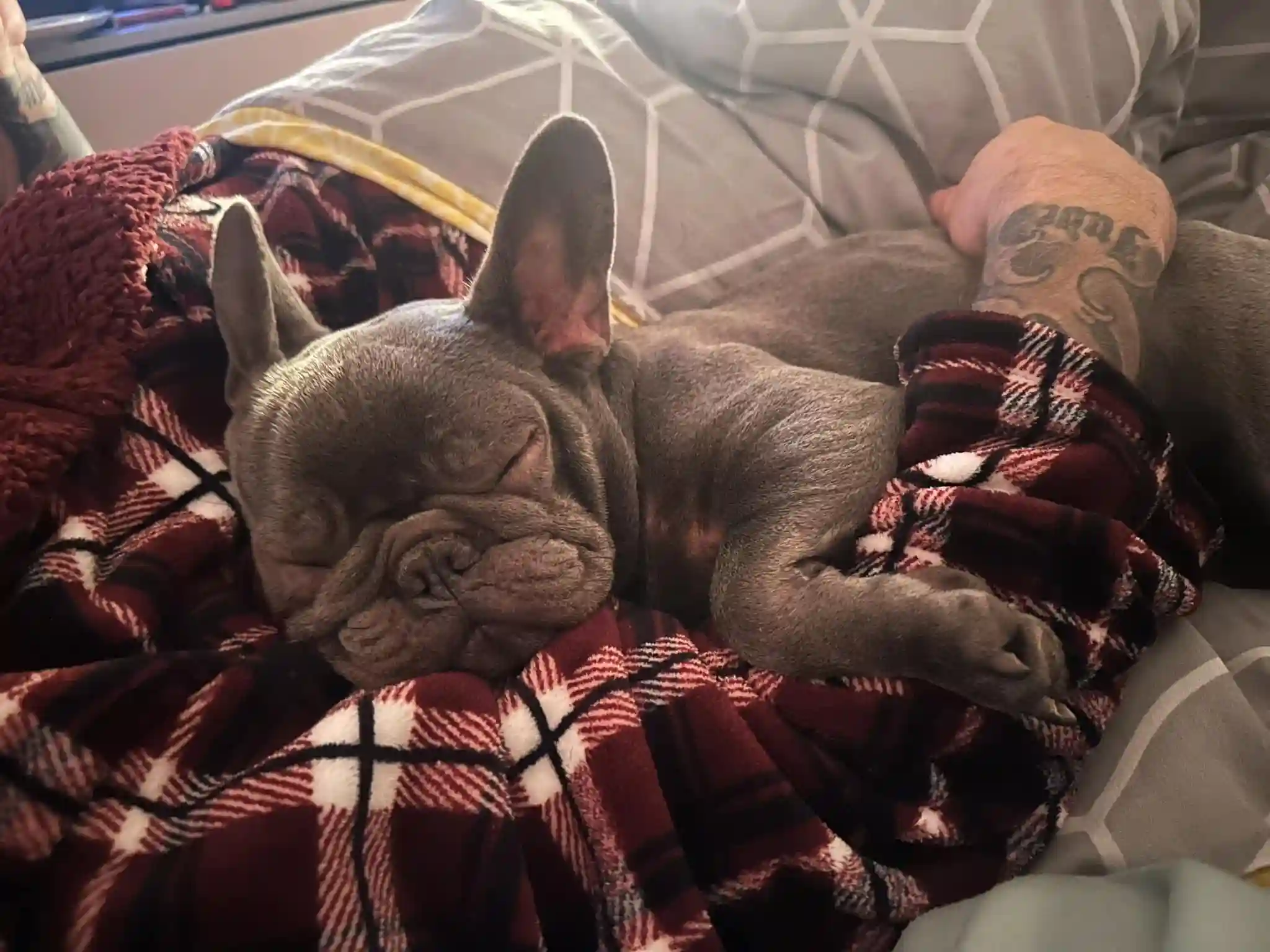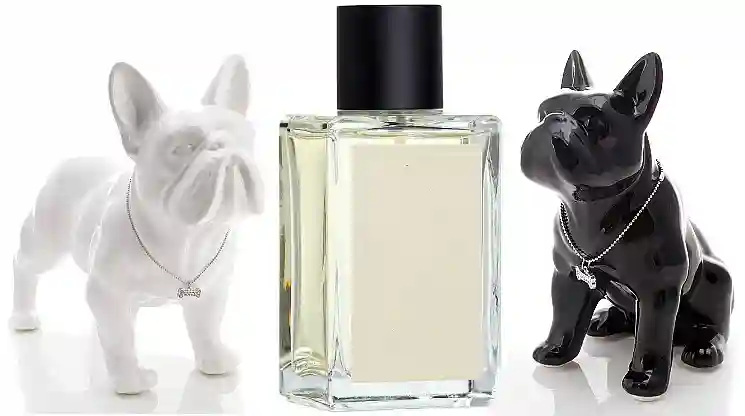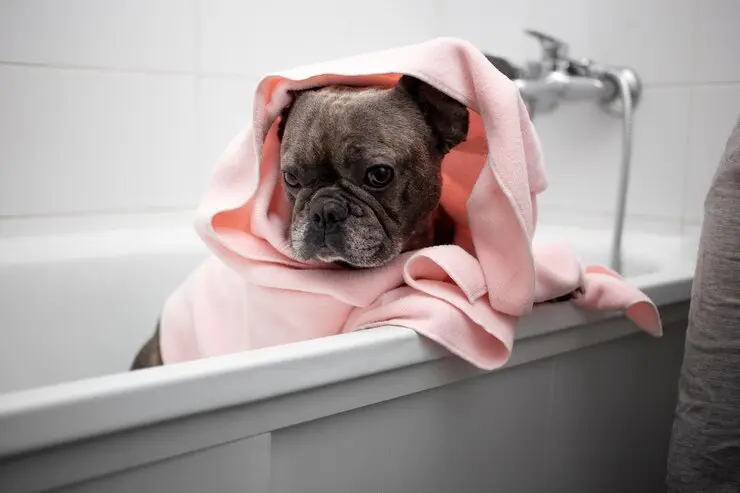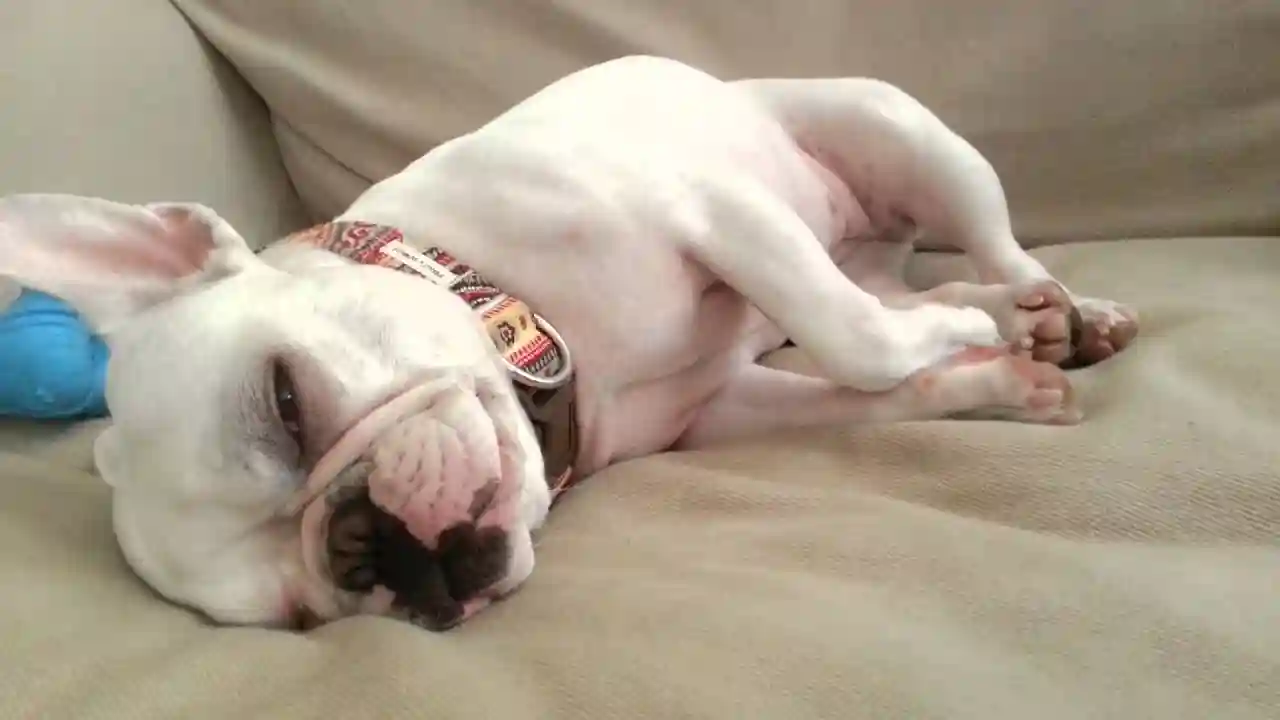How to make your French Bulldog smell good

Dogs hold a special place in our lives as our loyal companions, driving us to explore new ways to care for them.
Despite their innate cleanliness, our furry friends might not always exude the most pleasant aroma.
This holds particularly true for French Bulldogs, prompting the need for proper grooming.
In this article, we delve into the reasons behind the occasional odors and offer effective methods to ensure your French Bulldog stays fresh-smelling at all times.

Additionally, the summer months can amplify your Frenchie’s natural scent due to increased outdoor activities. To assist you in maintaining a delightful aroma around your beloved pooch, we’ve curated a set of tips, including natural remedies and safe, high-quality products tailored specifically for your French Bulldog’s well-being
Why Do French Bulldogs Have Odor Issues?
Understanding why French Bulldogs might emit unpleasant odors involves various factors, including breed characteristics, coat type, diet, and specific hormonal functions contributing to their scent.
Maintaining the freshness of your French Bulldog requires focused attention on their trouble areas, notably their folds and certain body parts.
Just as humans need daily showers to avoid unpleasant odors, regular care and cleaning routines are crucial for these furry companions to stay smelling delightful.
Various factors contribute to the distinctive smells associated with French Bulldogs. One primary cause revolves around yeast infections that often develop in the facial folds due to trapped food. Additionally, odors can arise from the paws, ears, and tail pockets, commonly preventable through consistent hygiene practices.
Facial Folds and Their Role in Odor
The endearing facial folds in French Bulldogs, while charming, can become a breeding ground for unpleasant smells. These folds demand regular cleaning to prevent the accumulation of trapped debris and subsequent pungent odors. Neglecting their maintenance not only results in foul smells but may lead to severe complications like inflammation and yeast dermatitis, requiring prompt veterinary attention and specialized antifungal treatments.

Addressing Key Odor Sources
- Dirty Facial Folds:
A French Bulldog’s facial folds swiftly gather odors if not cleaned daily. Wiping after meals, especially in warm environments, helps prevent foul smells and potential complications. - Ear Infections:
Their upright ears predispose French Bulldogs to debris accumulation, wax build-up, and moisture, culminating in bad odors and infections. Regular, gentle cleaning of visible areas minimizes infection risks, and signs like smelly ears or balance issues should prompt a vet visit. - Tail Pocket Care:
The tail pocket, a moisture-prone area, can emit strong odors if not kept meticulously clean. Regular checks and gentle cleansing prevent infections and overpowering smells. - Poor Diet:Inadequate nutrition is often a chief culprit behind foul odors in French Bulldogs. Low-quality, inexpensive food choices can significantly impact flatulence, breath, and skin/coat scent. Transitioning your Frenchie to a high-quality diet, rich in nutritious ingredients, can greatly enhance their overall health and aroma. Experimenting with various diets tailored for dogs and incorporating fresh, specially formulated foods often yields the best outcomes.

- Staying Damp For Too Long: Allowing your Frenchie to air dry post-bath or after swimming creates an ideal breeding ground for bacteria due to the warm and moist environment. This bacterial growth leads to unpleasant odors, potentially leaving your dog unclean and susceptible to infections. Ensuring proper drying using a towel or a low-medium heat setting on a hairdryer after any wet activity is crucial.
- Unhygienic Environment: Prolonged exposure to unclean surroundings can be evident in your Frenchie’s fur. Accumulated dirt, debris, or environmental odors cling to their coat, resulting in a dirty and foul-smelling dog. Restricting your French Bulldog’s access to unsanitary areas, especially those prone to causing bad smells or potential health risks, is essential.
- Unwashed Bedding:
Neglected cleaning of your Frenchie’s bed leads to an accumulation of skin, hair, dirt, and debris, providing a breeding ground for bacteria. Regularly washing your dog’s bed – preferably weekly or at least every two weeks – prevents bacterial growth that can transfer unpleasant odors to your pet.

- Dirty Ears:
Easily prone to dirt, excess wax, or bacteria, your Frenchie’s ears require regular cleaning to minimize odors and infection risks. Routine ear cleaning, especially upon visible dirt accumulation on the outside and monthly internal cleaning, helps maintain cleanliness and prevent smells.
- Anal Glands:
The anal glands might be the source of the most repugnant odor from your French Bulldog. Signs like a strong fishy smell, scooting behavior, or frequent licking indicate potential anal gland issues requiring veterinary attention for expression to alleviate both odor and discomfort.
- Yeast Infection:
Inflamed skin, intense itching, and a distinct smell akin to popcorn or corn chips often indicate a yeast infection. Timely treatment is essential to prevent exacerbation, necessitating consultation with a veterinarian for proper diagnosis and treatment.
- Skin Folds & Wrinkles:
French Bulldog’s skin folds can harbor bacteria and food residue, leading to unpleasant smells and potential infections if left uncleaned. Regular cleaning of facial folds daily or every two days, and body folds at least weekly, helps prevent bacterial buildup and subsequent odor.
- Dirty Paws:
Constant contact with various surfaces exposes your Frenchie’s paws to potential odorous substances and bacterial growth. Regular cleaning with warm water and thorough drying helps prevent odor development caused by accumulated dirt or spills.
- Flatulence:
Frenchies’ infamous flatulence can result from improper food digestion. Experimenting with different food choices can help identify and mitigate specific ingredients that induce excessive gas production, ensuring a more pleasant-smelling environment for both your Frenchie and yourself.

Addressing Other Smell Sources
Additional factors contributing to French Bulldog odors include bad breath and flatulence. Dental care, high-quality diets, and mindful feeding practices help combat bad breath, while dietary adjustments can alleviate excessive gas issues. Consulting a vet is crucial for persistent problems
How to Make My Frenchie smell Good?
Dealing with French Bulldog Coat Odor
Addressing the unique odor issues of a French Bulldog’s coat involves understanding the causes and adopting effective strategies for a pleasant-smelling furry friend. Several factors contribute to your Frenchie’s odor, warranting a closer look to identify potential triggers.
Swimming and Odor
If your Frenchie enjoys swimming, the wet coat might emit an unpleasant smell, influenced by their individual diet. Maintaining a fresh fragrance on their fur post-swim could involve using natural methods without relying on specific products.
Yeast Infection and Unpleasant Smells
A distinct odor resembling popcorn or cheese might indicate a yeast infection. Identifying signs such as itching, redness, or unusual skin discharge can prompt a need for natural remedies like an apple cider vinegar and water solution, provided it doesn’t aggravate any open wounds.
Tail Pocket Maintenance
Despite being tailless, Frenchies possess a hidden tail pocket prone to collecting debris and feces. Cleaning it regularly using gentle methods, such as baby wipes or a damp towel, prevents inflammation and potential discomfort.
Oral Hygiene and Breath
Maintaining proper oral hygiene for your Frenchie is crucial. Introducing brushing routines from an early age or opting for chew toys that aid in removing plaque and tartar helps combat bad breath without using specific commercial products.
Ear Cleaning for Freshness
Regularly checking and cleaning your Frenchie’s ears helps eliminate allergens or dust that may contribute to a less-than-pleasant scent. Utilizing a gentle cleaning solution followed by careful wiping, avoiding deep penetration, ensures cleanliness and odor control.

Coconut Oil for a Healthy Coat
Using extra virgin coconut oil as a natural spray can enhance your pet’s coat, giving it a glossy appearance and aiding in various skin issues. This natural remedy helps with itchy skin, inflamed wounds, and insect bites, without relying on commercial products.
Choosing Appropriate Shampoo
Selecting a natural shampoo free of parabens and artificial ingredients is essential for your Frenchie’s sensitive skin. Opting for Aloe Vera-infused shampoos without relying on baby or human products ensures gentle care and reduces skin irritations effectively.
Feel free to incorporate this revised content into your article! If you need further adjustments or additional info
WHAT OTHER FRENCH BULLDOGS OWNERS SAYS :
As French Bulldog owners ourselves, we interact with fellow Frenchie owners regularly.
We’ve engaged in conversations about this topic within the Frenchie community and conducted additional research on platforms like Reddit and various social media channels.

Aside from baths at the pet store that really dry everything, I would suggest you to always clean its ears, face and feed with wipes (I use special ones to avoid problems on the face wrinkles), also remember do dry it after. I also use regular wipes on the body and powder. Also in order to protect the wrinkles and make my frenchie smell better I use coconut oil on the wrinkles. Doing this once a week does the trick (except for baths, that’s like once a month).
I do bath every 3 weeks and then daily wipe downs with vinegar water. Good to remove the allergens too. Daily ear cleaning and folds cleaning and a wipe of a Stridex pad under the jaw/chin to keep the acne away. Also this is for an adult dog.
FAQs About Keeping Your French Bulldog Smelling Fresh
How often should I bathe my French Bulldog to maintain a pleasant smell?
The frequency of bathing your French Bulldog varies based on their lifestyle and activity levels. Generally, aim for bathing your Frenchie every 2-3 months or as needed when visibly dirty to maintain cleanliness without stripping essential oils from their skin.
What should I do if my French Bulldog’s coat has a persistent foul smell despite regular bathing?
Persistent odors could indicate underlying issues. Check for potential problems like yeast infections, uncleaned skin folds, ear infections, or improper drying after getting wet. If the smell persists, consulting with a veterinarian is advisable for a thorough examination and guidance.
How can I naturally freshen my French Bulldog’s coat without using commercial products?
Natural remedies like apple cider vinegar and water solutions for yeast infections, gentle coconut oil sprays for coat health, and routine cleaning with mild, non-irritating substances such as baby wipes or damp towels can help maintain a fresh-smelling coat without relying on commercial products.
Are there specific dietary changes I can make to improve my Frenchie’s odor?
Transitioning your French Bulldog to a high-quality diet rich in nutritious ingredients often improves overall health, potentially impacting odor issues. Avoid low-quality foods known to contribute to flatulence or unpleasant body odors.
How do I clean my French Bulldog’s ears without causing discomfort?
Carefully clean your Frenchie’s ears using a gentle cleaning solution, avoiding deep penetration. After applying the solution, allow your dog to shake its head to remove excess liquid. Gently wipe the visible parts of the ear with a cotton ball or gauze, being cautious not to go deeper than the depth of one knuckle.
What’s the best approach to maintain oral hygiene for my French Bulldog?
Introduce tooth brushing routines from an early age, preferably with dog-friendly toothbrushes or chew toys designed to help remove plaque and tartar. Avoid human toothpaste and opt for pet-safe alternatives to maintain oral health and reduce bad breath.
Can I use human shampoos or baby products for my French Bulldog’s baths?
It’s advisable to avoid human shampoos and baby products due to differences in skin pH levels. Opt for natural dog shampoos without parabens or artificial ingredients, preferably formulated for sensitive skin to avoid potential skin irritations.
How should I approach cleaning my Frenchie’s tail pocket?
Regularly clean the tail pocket using gentle methods like baby wipes or a damp towel to prevent debris accumulation. Ensure thorough but gentle cleaning to avoid inflammation and discomfort in this sensitive area.




